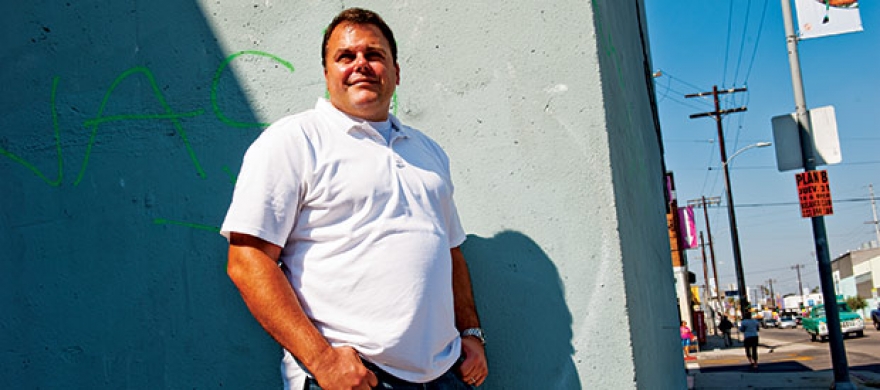Los Angeles Calling
GSEP student Rev. Romney Ruder works on the mission field in his own backyard.
Each day Rev. Romney Ruder takes a four-block walk through South Los Angeles from his home to his office. On the walk he encounters graffiti, garbage, the open drug trade, and a staggering number of destitute and homeless people. “Most people would think it was a third world country,” says Ruder of the neighborhood he, his wife, and two sons call home.
Ruder chooses to live in South Los Angeles as part of his mission work with World Impact, where he serves as chief operating officer. In order to empower the urban poor, the organization starts with missionaries on the ground. “If we’re going to have an effect on the community, we have to be a part of the community,” he explains. “That means being among the people we are serving. It’s living on the same streets.”
By living in the community, the Ruders see what everyday life is like in South Los Angeles. They have learned that it’s not uncommon for the neighborhood to go three days without mail service. Sometimes police helicopters circle above for hours. On one occasion, 10 plainclothes police officers ran down the street with assault rifles while Ruder’s sons played in the backyard.
These experiences have helped the Ruders learn about the major obstacles many of their
neighbors face every day. “We know that there is that brokenness in the more wealthy
communities, but
it gets hidden,” describes Ruder. “In our neighborhood, the level of brokenness is
such that you can’t hide it. You can hear the yelling. You can hear the slaps. We
know when the kids aren’t getting three meals a day. There’s complete honesty, and
there’s more opportunity to engage and say, ‘Let’s talk about this.’”
Ruder took his post with World Impact four years ago after more than 20 years in the
business world. About 12 years ago, he reached a point in his career where a few small
banks invited him to join their board of directors. After speaking with his wife Amy,
they decided that instead of earning more money
he would invest his time in something “kingdom-related.”
“In our faith walk, the Lord had continued to add more and more ministry,” Ruder explains of his career transition. By the time World Impact recruited him, he felt called to be a missionary full-time. His current post is unique in that while he serves as a missionary in his neighborhood, he also is COO for the organization, spending time strategizing how to establish leadership in the communities they serve and partnering with like-minded organizations.
To further those efforts, he enrolled in the organizational leadership program at the Pepperdine Graduate School of Education and Psychology, where he is a doctoral student. Describing the program as a strong fit for him, Ruder enjoys “getting to the core of where a lot of us organizations struggle.”
The main challenge at World Impact is how to serve the urban poor while creating self-sustaining ministries. Working with missionaries and indigenous leadership, they start Bible studies that manifest into home churches and then into full-fledged churches and then church plants. At the same time, the organization provides holistic ministry to the communities through mobile medical clinics, dental clinics, thrift stores, job training, and schools.
In cities throughout the U.S., the urban poor face issues such as high crime, failing schools, and lack of basic medical care. “When people think of a missionary they think about going overseas, but we have such an opportunity to minister in our own cities,” Ruder begins. He points to Chester, Pennsylvania, where the amount of murders per capita outpaces other cities in the world. He cites the Imperial Courts area in South Los Angeles, the largest housing district in the world, which has no hospital to serve the area. World Impact’s medical clinic saw more than 1,500 patients there last year.
At their location in North St. Louis, Missouri, 30 percent of the housing sits empty
and dilapidated. “It looks like a war zone,” Ruder says of the houses that have been
picked clean of all metal, bricks, and anything of value. The poverty in the area
is exacerbated by the fact that the local school system is unaccredited. More than
50 percent of students drop out, and those that
do graduate can’t go to college because they have no transcript a college would accept.
“When I walk into North St. Louis or Chester, people think one of three things: I’m either a cop, I’m there to buy drugs, or I’m there to spread the word of Christ,” Ruder says of the urban areas that are often ignored by the wealthier neighbors just miles away. “Sometimes the people we forget about are those in our own backyard.”
As he continues to serve the urban poor at home in Los Angeles, Ruder envisions a future for World Impact that relies even more greatly on indigenous leaders. “It’s not about us starting a church and leading a church,” he reflects. “It’s about working with people who have heard the call of Christ who need to be equipped, so they can raise up and be leaders in their community.”
